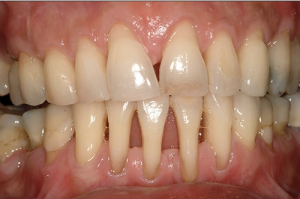Oral health is essential for living well, even though many people consider dental problems minor or not as impactful to health. However, issues like periodontal disease, for example, can cause serious damage to our health and prevent us from living a full life. One way to get rid of it is the well-known periodontal surgery. But when is it really necessary? To discuss the subject, we first need to clarify what the disease is and how it appears in our teeth. So, read on and learn more about this very common and complex condition.
What Is Periodontal Disease?
Also known as periodontitis, periodontal disease is caused by infections or inflammations in the periodontium, the area in the mouth that includes the ligaments, bones, and tissues that support our teeth. In advanced stages, the disease can be quite harmful, causing the destruction of these tissues and, consequently, leading to tooth loss. It is very common for the term gingivitis to be used to refer to this type of problem, although it represents only one stage of the disease. Therefore, the disease itself can be considered an evolution of gingivitis. Poor oral hygiene is, without a doubt, the main cause of periodontitis. For this reason, the best way to deal with this problem is always prevention. It is one of the main causes of tooth loss and one of the most common diseases in humans. Even so, many people don’t know exactly what the treatments are and have no idea how the surgery is performed.
What Is Periodontal Surgery?
Periodontal surgery is nothing more than the most aggressive way to treat periodontitis, that is, when the disease is already in a critical state. It is important to note that periodontal disease can also be chronic, yet surgery may still be required to resolve the problem. Although it is an aggressive procedure and may sound scary to many, the surgery is performed in a relatively simple way, though certain post-operative care is necessary. It’s important to highlight that this treatment method is a last resort, meaning it is used when all other types of treatments, such as those involving fluoride, scaling, and oral hygiene, are no longer effective. In some cases, a dentist will also prescribe medication to help combat the disease. If this happens, it’s important that you take the medication responsibly, meaning following the instructions exactly. If the disease returns, the recommended action is to visit the dentist again and never take medication on your own. They may not have the desired effect and could end up causing other issues that make your situation worse. 
How Is the Surgery Performed?
The most common surgery used to treat periodontitis is what’s called a gingival flap. It basically consists of cutting the gum tissue to separate the teeth and make cleaning easier, which in this case is done with an ultrasonic device. In addition, the surgery also makes it easier to manually remove deeper bacterial plaque and tartar. Besides this initial stage, a dentist may choose to carry out two more stages of the surgery, which are usually performed to avoid reinfection and also for aesthetic reasons. In the stage called regeneration, the dentist inserts bone grafts and proteins that will stimulate the reconstruction of tissues that were cut in the first stage of the surgery. The third stage, called soft tissue graft, is when a dentist inserts tissue from other parts of the mouth to give a more presentable appearance to the gums and mouth as a whole, since they can look quite altered after the surgery. This third stage is not always performed and always depends on a discussion between the patient and dentist to determine whether it is really necessary.
Are There Risks?
Periodontal surgery is very safe, meaning the risks involved are minimal or virtually nonexistent. The greatest risk actually occurs when a person has periodontitis and does not treat it or skips the surgery, as this can lead to extreme oral discomfort as well as tooth loss.
Can the Disease Return After Surgery?
The effects of periodontal surgery are usually very positive, which means the procedure normally eliminates the disease successfully. Even so, it’s important to follow the recommended post-operative care, as other complications, such as infections, can arise during this period. Of course, if a person continues to have poor oral hygiene habits, the disease can return just the same. In fact, when a person has chronic periodontitis, the chances of it progressing to a more aggressive form of the disease increase as time passes and proper care is not taken. That’s why prevention is always the best solution.
How to Prevent Periodontal Disease?
Preventing periodontal disease is very simple; you just need to establish good oral hygiene habits, such as brushing your teeth several times a day and flossing. It is also important to see a dentist regularly (at least once every six months) so you can get checked and catch any potential problems early. All of this helps you avoid developing periodontitis. Undergoing this type of surgical procedure can require a lot from you—not only in terms of time, since you need to change your lifestyle habits both before and after the surgery, but also regarding your health and finances. Therefore, our main recommendation here is that you strictly follow all the recommendations to avoid getting the disease and thus avoid more aggressive treatments like periodontal surgery. Remember: taking care of your oral hygiene is also taking care of your health. And preventing problems like periodontal disease is essential to maintaining your well-being as well.











